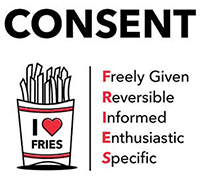The Meaning of Consent
Consent
Many people have been taught that “no means no.” Our message to students regarding consent is “yes means yes,” especially an enthusiastic yes! Here we discuss the importance of communicating with your partner, knowing the Montana law regarding consent, and having an open and honest dialogue with about relationships.
Consent is:
- A mutual agreement
- Ongoing
- Given freely
- Can be retracted at any time
- Enthusiastic!
Consent is not:
- Coercion
- Power
- Guilt
- Threatened
- Manipulation
- Using alcohol/drugs
The term “consent” means words or overt actions indicating a freely given arrangement to have sexual intercourse or sexual contact and is further defined, but not limited to:
- An expression of lack of consent through words or conduct means there is no consent or that consent has been withdrawn;
- A current or previous dating or social or sexual relationship by itself or the manner of dress of the person involved with the accused in the conduct at issue does not constitute consent; and
- Lack of consent may be inferred based on all of the surrounding circumstances and must be considered in determining whether a person gave consent.
The victim is incapable of consent because the victim is:
- mentally disordered or incapacitated;
- physically helpless;
- overcome by deception, coercion, or surprise;
- less than 16 years old;
MSUB’s policy and procedures mirrors MSU’s.
Consent is an understandable exchange of affirmative words or actions, which indicate a willingness to participate in mutually agreed upon sexual activity. Consent must be informed, freely and actively given. If coercion, intimidation, threats, or physical force are used there is no consent.

There is no consent when there is force, expressed or implied, or use of duress or deception upon the victim. In the absence of mutually understandable words or actions, it is the responsibility of the initiator, or the person who wants to engage in the specific sexual activity, to make sure that he/she has the consent from his/her partner(s). Silence does not necessarily constitute consent. Past consent to sexual activities does not imply ongoing future consent. Whether an individual has taken advantage of a position of influence over an alleged victim may be a factor in determining consent. Effective consent may not be given by minors less than 16 years old.

